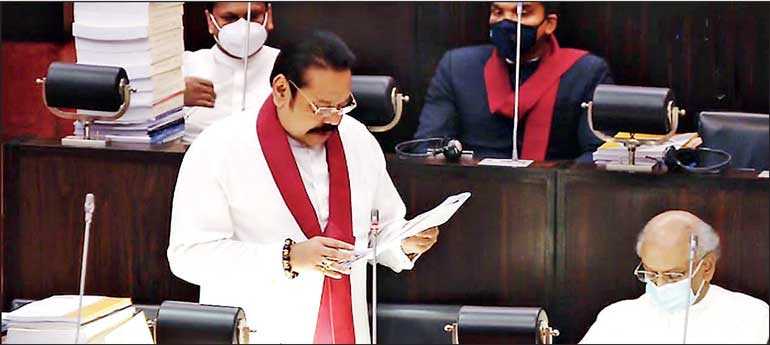Thursday Feb 26, 2026
Thursday Feb 26, 2026
Friday, 13 November 2020 00:00 - - {{hitsCtrl.values.hits}}

Prime Minister Mahinda Rajapaksa during the Second Reading debate of Appropriation Bill 2020 in Parliament yesterday
By Chandani Kirinde
Prime Minister Mahinda Rajapaksa yesterday delivered a blistering criticism of the previous Government, blaming it for stalling growth on all fronts, and pledged a massive turnaround during the next four years.
“The economy and the financial position passed down to us is pathetic. It has to be acknowledged that this pathetic situation is due the failed economic and fiscal management programs implemented in the last five years by the previous regime, as well as the attempt to create an import-based economy instead of a true production economy,” said Rajapaksa, who is also the Finance Minister, kicking off the Second Reading debate of Appropriation Bill 2020 in Parliament.
He said the policy of the Government was to change the disastrous socio-economic path that the country has embarked on in the last five years.
“If the country is to achieve economic independence, then it is mandatory that we change course. It is the responsibility of our Government to reduce the income expenditure gap to 4% of GDP by 2025, which now stands at nearly 10% and to reduce the overall debt to GDP to 75% of GDP within the next four years,” he said.
Rajapaksa said that a market economy that was dependent only on tea and apparels, with imports that were twice that of the exports without value additions to local resources and raw materials, would not facilitate sustainable development.
“Development aspirations of the people cannot be met depending only on import-led-consumption and industrialisation, without focus on food security and agro-industrialisation and allied services based on agriculture, fisheries and livestock development. We have to not only convert a negative economy to a positive high economic growth rate of 6%, but such growth should result in the eradication of poverty,” he said.
The Prime Minister said that the new Government’s accomplishments in 2020 even amidst many challenges were considerable. These, he said, include solving the unemployment issue with nearly 40,000 people under the program to be provided with jobs, by targeting 100,000 people from the poorest families. “Our aim is to complete the 100,000 target before the end of this year.”
He also said the Government had reduced VAT and NBT from 17% to 8% and increased the applicable turnover threshold for VAT to Rs. 25 million per month (it was Rs. 1 million per month previously) exempting most small and medium scale businesses from VAT, removed income taxes on agriculture, plantation crops, livestock and farm activity and removed the PAYE tax on information technology-related jobs and foreign employment.
“By reducing the annual interest rates on Treasury bills and Treasury bonds from 15 to around 5%, not only were we able to reduce the pressure of interest cost, but was also able to disburse loans amounting to almost Rs. 250 billion to those public and private entities that were struggling. We were able to stabilise the exchange rate, which was steadily depreciating then at around the Rs. 185 level and to service the foreign debt of $ 4,200 million, thus averting the country being classified into a debt default status.”
He said the Government was also able to ensure a minimum price for paddy at Rs. 50 per kilogram, while stopping the import of rice and also provided an attractive guaranteed price to expand the production of paddy, maize, grains, potatoes and onions by managing the import taxes.
He said the outstanding bills to medical and fertiliser suppliers and contractors had been settled through the Vote on Account and the required provisions were included in the Appropriation Act.
With reference to SriLankan Airlines (SLA), Rajapaksa said due to the suspension of the program in 2015 (that commenced in 2013) to strengthen the SLA by infusing capital of $ 500 million over five years and the subsequent efforts to privatise the SLA had made it financially weak.
He said the Government expected to infuse $ 500 million of capital in the medium-term, of which $ 150 million would be provided in 2020.